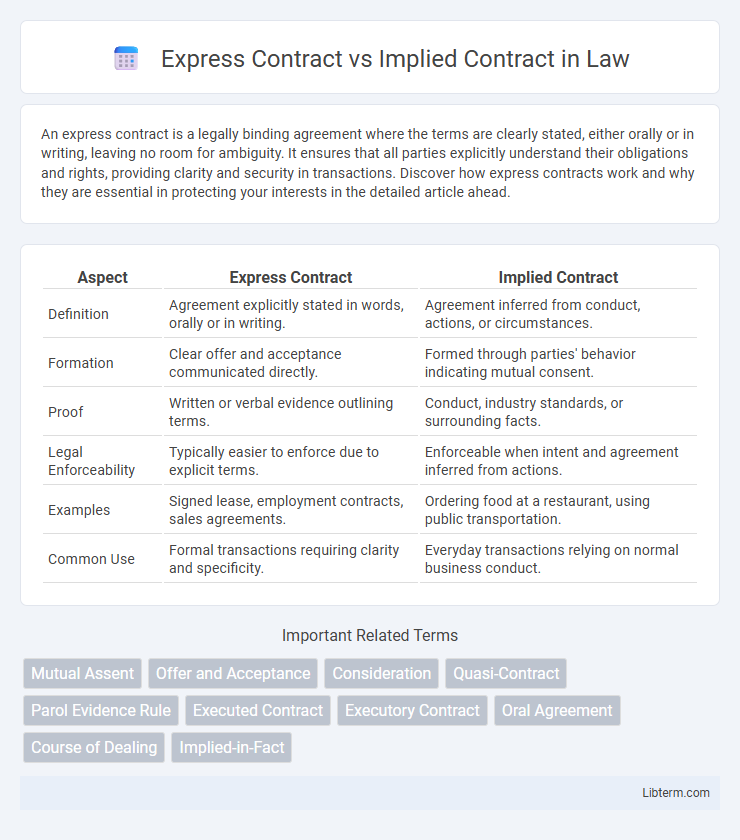An express contract is a legally binding agreement where the terms are clearly stated, either orally or in writing, leaving no room for ambiguity. It ensures that all parties explicitly understand their obligations and rights, providing clarity and security in transactions. Discover how express contracts work and why they are essential in protecting your interests in the detailed article ahead.
Table of Comparison
| Aspect | Express Contract | Implied Contract |
|---|---|---|
| Definition | Agreement explicitly stated in words, orally or in writing. | Agreement inferred from conduct, actions, or circumstances. |
| Formation | Clear offer and acceptance communicated directly. | Formed through parties' behavior indicating mutual consent. |
| Proof | Written or verbal evidence outlining terms. | Conduct, industry standards, or surrounding facts. |
| Legal Enforceability | Typically easier to enforce due to explicit terms. | Enforceable when intent and agreement inferred from actions. |
| Examples | Signed lease, employment contracts, sales agreements. | Ordering food at a restaurant, using public transportation. |
| Common Use | Formal transactions requiring clarity and specificity. | Everyday transactions relying on normal business conduct. |
Introduction to Express and Implied Contracts
Express contracts are agreements in which the terms are clearly stated, either orally or in writing, outlining the obligations and expectations of each party involved. Implied contracts are formed based on the actions, conduct, or circumstances of the parties, rather than explicit words, indicating mutual consent. Both types of contracts are legally binding but differ fundamentally in how the agreement is communicated and interpreted.
Definition of Express Contract
An express contract is a legally binding agreement in which the terms are clearly stated and explicitly communicated between parties, either orally or in writing. This type of contract outlines the specific rights, duties, and obligations agreed upon, ensuring mutual understanding and consent. Express contracts contrast with implied contracts, where terms are inferred from actions or circumstances rather than direct communication.
Definition of Implied Contract
An implied contract is a legally binding agreement formed through the actions, conduct, or circumstances of the parties rather than explicit written or spoken words. Unlike an express contract, which is clearly stated and agreed upon, an implied contract is inferred from the behavior or situation, indicating the parties' mutual intent to enter into an agreement. Implied contracts commonly arise in situations where goods or services are provided and accepted, suggesting an obligation to pay or perform despite no formal negotiation.
Key Differences Between Express and Implied Contracts
Express contracts clearly state the terms and conditions either orally or in writing, ensuring both parties explicitly agree on the obligations involved. Implied contracts, on the other hand, form based on the behavior, conduct, or circumstances suggesting mutual agreement without spoken or written words. The key differences lie in express contracts' explicit communication of terms versus implied contracts' reliance on inferred consent and actions demonstrating agreement.
Elements Required for a Valid Express Contract
An express contract requires a clear offer, explicit acceptance, and mutual consideration, demonstrating the parties' definite agreement on essential terms. The intent to create legal relations must be evident, with communication of terms either orally or in writing. These elements ensure enforceability by clearly establishing obligations and rights between parties.
Elements Required for a Valid Implied Contract
An implied contract requires mutual consent demonstrated through conduct, clear terms inferred from actions, and lawful consideration exchanged between parties. The essential elements include an offer indicated by behavior, an acceptance inferred from performance or silence, and a meeting of minds established by factual circumstances implying agreement. Courts analyze the parties' intentions and the context to confirm that these elements satisfy the criteria of a valid implied contract.
Legal Enforceability: Express vs Implied Contracts
Express contracts are legally enforceable agreements where terms are explicitly stated, either orally or in writing, ensuring clear mutual consent and obligations. Implied contracts, derived from actions or conduct rather than explicit words, also hold legal enforceability but require courts to infer the parties' intent based on circumstances. Both contract types form binding agreements, but express contracts offer stronger clarity in proving terms during legal disputes.
Real-World Examples of Express Contracts
Express contracts are explicit agreements where terms are clearly stated, such as a signed lease agreement outlining rent and duration. A common real-world example is a service contract between a homeowner and a contractor specifying project scope and payment. These clearly defined terms reduce misunderstandings and provide strong legal enforceability.
Real-World Examples of Implied Contracts
Implied contracts frequently occur in everyday scenarios such as dining at a restaurant, where the customer orders food knowing they must pay, or visiting a doctor, where the patient receives treatment expecting to compensate the provider. Another common example is ride-sharing services, where passengers enter a vehicle under the assumption they will pay the fare after the ride. These real-world instances demonstrate how implied contracts rely on the conduct and circumstances rather than explicit written or spoken agreements.
Choosing Between Express and Implied Contracts in Business
Choosing between express and implied contracts in business depends on clarity and certainty of terms. Express contracts provide explicit agreements with defined obligations, reducing disputes and ensuring enforceability. Implied contracts rely on actions or circumstances, suitable when formal documentation is impractical but carry higher risks of ambiguity and legal challenges.
Express Contract Infographic

 libterm.com
libterm.com